- Home
- David Brin
Brightness Reef u-4 Page 16
Brightness Reef u-4 Read online
Page 16
“Well, what can you tell me about them? For instance, do they show any aptitude for tool use?”
Lark needed neither psi nor rewq to read the mind of his lovely guest. He carried her question toward its unmistakable aim.
Do they show a talent for machinery? For war and commerce? For philosophy and an?
Do they have Potential? The magic essence that it takes to profit from the right kind of help?
Do they have the rare tincture, the promise, that makes a patron’s push worthwhile? The stuff to become starfarers someday?
Are they prospects for uplift?
Lark concealed his surprise over her ignorance. “Not to the best of my knowledge,” he answered honestly, since the only squirrels he’d seen were in ancient, faded pictures from old Earth. “If we pass near any, you can see for yourself.”
Clearly, the star-forayers were here seeking bio-treasure. What else might poor Jijo offer that was worth sneaking past the sentries of the Migration Institute, slipping through star-lanes long ceded to the strange, menacing civilization of the Zang, then braving Izmunuti’s deadly carbon wind?
What else? Lark pondered. Except refuge? Ask your own ancestors, boy.
The newcomers made no pretense, as Lark might have expected, of representing a galactic agency or feigning a legal right to survey Jijo’s biosphere. Did they think the exiles had no memory of such things? Or did they simply not care? Their goal — data about changes since the Buyur left — made Lark’s lifework more precious than he ever imagined. So much that Lester Cambel had ordered him to leave his notebooks behind, lest they fall into alien hands.
The sages want me to play it close. Try to find out at least as much from her as she learns from me.
A foredoomed plan, of course. The Six were like infants, ignorant of the rules of a deadly game. Still, Lark would do his best, so long as his agenda and the sages’ remained the same. Which might not always be the case.
They know that. Surely they’ve not forgotten I’m a heretic?
Fortunately the forayers had assigned their least intimidating member to accompany him. It might just as easily have been Rann, a huge male with close-cropped gray hair, a booming voice, and a wedgelike torso that seemed about to burst from his snug uniform. Of the two others who emerged from the black station, Kunn was nearly as masculinely imposing as Rann, with shoulders like a young hoon’s, while pale-haired Besh was so dramatically female that Lark wondered how she moved so gracefully with a body that prodigiously curved. Compared to her colleagues, Ling seemed almost normal, though she would have caused a stir growing up in any Jijoan town — no doubt provoking many duels among hot-tempered suitors.
Don’t forget your vow, Lark reminded himself, puffing in exertion while climbing a steep part of the trail. Perspiration stained the front of Ling’s blouse, which clung to her in provocative ways. He forced himself to look away. You made a choice, to live for a goal greater than yourself. If you wouldn’t forsake that aim for an honest woman of Jijo, don’t even think about giving it up for a raider, an alien, an enemy of this world.
Lark found a new way to direct the heat in his veins. Lust can be blocked by other strong emotions. So he turned to anger.
You plan to use us, he mused silently. But things may turn out different than you think.
That attitude, in turn, roused an obstinate layer, overcoming his natural curiosity. Earlier, Ling had said something about humans no longer being considered wolflings, out among the stars. No longer orphans, without patrons to guide them. From the look in her eye, she had clearly expected this news to cause a stir. No doubt she wanted him to beg for further information.
I’ll beg if I must — but I’d rather buy, borrow, or steal it. We’ll see. The game’s just in its opening rounds.
Soon they passed stands of lesser-boo. Ling took samples of some segmented stems — each no more than ten centimeters across — deftly slicing near-transparent sections into her analyzer.
“I may be a dumb native guide,” he commented. “But I’ll wager boo doesn’t show much sign of pre-sapience.”
Her head jerked when he said the word. Thus Lark ended one pretense.
We know why you’re here.
Ling’s dusky skin did not hide a flush. “Did I suggest any such thing? I just want to track genetic drift since this species was planted by the Buyur. We’ll need a benchmark to compare trends in animals. That’s all.”
So we begin the outright lies, he thought. From fossil evidence, Lark knew that boo already thrived on Jijo long before the Buyur won their lease, twenty million years ago. Perhaps it was imported by a previous tenant. Whole ecosystems had coevolved around the successful vegetal type, and countless animals now relied on it. But things must have been rough for the first aeon or so, as boo pushed native flora out of many watersheds.
Lark knew little about the biochemical level, but from fossils he was sure the genus hadn’t changed much in a hundred million years.
Why would she lie about something so unimportant? The Scrolls taught that deceit was not only wrong, but also a fickle, dangerous ally. And habit forming. Once you start lying, it’s hard to stop. Eventually it is small, needless lies that get you caught.
“Speaking of pre-sapience,” Ling said, folding her sample case, “I can’t help wondering where you folks stashed your chimpanzees. I’m sure they must have drifted in interesting ways.”
It was Lark’s turn to give away too much with an involuntary twitch. Denial was useless. Humans don’t need rewq to play this game with each other — reading clues in each other’s faces. Lester must know I’ll betray as much as I learn.
“Chimps are like children. Naturally we sent them away from possible danger.”
Ling looked left and right. “Do you see any danger?”
Lark almost burst out with sardonic laughter. In Ling’s eyes danced a complexity of things he could only guess. But some thoughts were clear without being spoken aloud.
You know that I know. I know that you know that I know. And you know that I know that you know that I know…
There is another emotion that can overcome hormonal lust, or the fury of anger.
Respect.
He nodded to his adversary, meeting her gaze full on.
“I’ll let you know if we pass near any chimps, so you can see for yourself.”
Ling had extremely sharp vision and proved it frequently by spotting movements Lark would have missed — forest creatures foraging, browsing, hunting, or tending their young. In this, she reminded him of Dwer. But Ling also owned many tools, which she brought swiftly to bear on whatever crawling, flitting, or ambling thing caught her attention.
She must really have studied those old Buyur records, for their progress was slowed by frequent sighs of recognition, when she would classify a species of shrub, tree, or four-winged bird, then ask Lark to add whatever quaint name the locals used. Lark gave cautious answers — just enough to support his value as a local expert.
Sometimes Ling would pause and mutter into her ring, as if contemplating what she had learned. Lark realized with a shiver that she must be in contact with her base. This was speech at a distance, not like semaphore, far-casting, or even rare psi-telepathy, but the high-tech kind mentioned in books, perfect and reliable. The voice of the person at the other end could barely be made out as a whisper. He guessed it must be projected somehow, compactly, to the region near her ear.
At one point, Ling murmured in a dialect form of Anglic, rather hard to follow.
“Yea, yea… Oright. A’ll try to speed ip. But yigotta chuz — distince er ditail.”
The other party must have been persuasive, for Ling picked up the pace when the march resumed — until the next excited discovery caused her to forget her promise and go right back to dawdling over some intriguing detail. Lark found this character flaw — how easily she was distracted by the sight of living things — the first thing he honestly liked about her.
Then Ling spoiled it by patr
onizing him, defining — in slow, simple words — what “nocturnal” meant. Lark quashed resentment. He had read enough adventure novels as a kid to know how a native guide was supposed to act. So he thanked her respectfully. There might be future advantages to be had in letting her maintain her stereotypes.
For all of Ling’s enthusiasm and keen eyesight, she was no hunter like Dwer. Even to Lark, the surroundings frothed with signs-footprints and broken stems, feces and territory marks, wisps of fur, scale, feather, and torg. Any child of the Six could read such stories, found along the path. But Ling seemed aware only of what was currently alive.
Thinking about Dwer made Lark smile. By the time he gets back from his mundane glaver hunt, I’ll be the one with wild stories to tell, for a change.
At intervals, Ling unfolded an instrument with twin “holio screens,” one showing a forest scene that rippled and moved as Lark stared over her shoulder, showing someplace nearby, he could tell from the foliage. The other screen displayed charts and figures he found indecipherable-which was humbling. He had read nearly every biology text in Biblos and figured he should at least understand the vocabulary.
Maybe the “Yes, bwana” routine isn’t such an act. Turns out I may be illiterate, after all.
Ling explained this was data from one of the robot probes, climbing the same path some distance ahead. “Could we move faster now?” she asked eagerly. “The robot has subdued some interesting specimens. I want to reach them before they deteriorate.”
She had been the one dawdling. Still, Lark only nodded.
“Whatever you say.”
The first specimen was a hapless wuankworm whose burrow had been sliced open with scalpel-smoothness. A web of fibrous stuff defied repeated battering by the worm’s bony head, as it fought futilely to escape.
Ling spoke into her ring. “This feral form seems related to ore-gleaners the Buyur imported from Dezni, three aeons ago. Dezni-evolved organisms should estivate after injection with clathrate of methane. We’ll try a larger dose now.”
She aimed a device that sent a slender tube flashing like a resolute predator, piercing a crease between two armor plates. The worm flinched, then slumped, quivering.
“Good. Now let’s see if encephalization has changed during the last megayear.” She turned to Lark and explained. “That’s to see if they have more brain matter.”
Now that I knew, he thought, but restrained himself and remarked instead,
“How perfectly amazing.”
Lark learned to pass instruments, draw blood, and assist his employer as required. At one point the raspy tongue of an angry longsnout whipped between the strands of its cage and would have torn strips off Ling’s arm, if he had not yanked it away in time. After that, Ling seemed to realize her “native guide” had uses beyond toting, carrying, and being impressed whenever she spoke.
Though the robot’s specimens were “brainy” types, living by their wits as hunters or omnivorous gatherers, Lark thought none of them likely prospects for uplift. Maybe in ten million years, when this galaxy is reopened for legal settlement. By then, longsnouts or leap raptors may be ready, tested by evolution and Ifni’s luck, primed for adoption by some kindly elder race.
Yet, watching her use sorcerous rays and probes to appraise a mangy-looking carrion snorter, Lark could not help but imagine the beast responding by rearing up on its hind legs and reciting an ode to the comradeship of living things. Ling’s group clearly thought they might find something precious, emerging on Jijo ahead of schedule. Once potential is there, all it takes is help from a patron to set a new race on the Upward Path.
A few texts in Biblos disagreed. A birth does not always need a midwife, they claimed.
Lark chose to follow up that idea during the next part of the trek.
“A while back you implied Earthlings aren’t known as wolflings anymore.”
Ling smiled enigmatically. “Some still believe that old myth. But others have known the truth for quite a while.”
“The truth?”
“About where we came from. Who gave humanity the boon of thought and reason. Our true patrons. The Rothen mentors and guides we owe everything we are, and ever will be.”
Lark’s heart beat faster. A few tomes on the subject had survived the fire that ravaged the Biblos xenology shelves, so he knew the debate was still raging when the sneakship Tabernacle left for Jijo, three centuries ago. In those days, some speculated that humanity had been helped, in secret by clandestine benefactors, long before the historical era. Others held out for the model of Darwin — that intelligence could evolve all by itself, without outside help, despite the skepticism of Galactic science. Now Ling insisted the debate was settled.
“Who are they?” Lark asked in a hushed voice. “Did some Rothen come to Jijo with you?”
That smile returned, a knowing look, tugging her high cheekbones. “Truth for truth. First you tell me the real story. What’s a pack of humans doing here on this dreary little world?”
“Uh… which pack are you talking about? Yours or mine?”
Her silent smile was his only answer, as if to say — “Go ahead and be coy, I can wait.”
Ling followed tracers left by the relentless robot, leading from one sedated creature to the next. As the day waned, she picked up the pace until they reached the crest of a long ridge. From there, Lark saw several more plateaus to the north, slanting up toward Rimmer peaks. Instead of the usual covering of native trees, the nearest mesa bore a blanket of darker green, a dense sward of giant boo — stems so huge that individuals could be made out even from where he stood. A few streaks of stone, and one of water, broke the expanse of gently swaying tubes.
Their final specimen was an unfortunate rock-staller, no more than a curled-up ball of spines when they cut away the webbing the robot used to restrain its victims. Ling prodded the creature with a tool that emitted a short, sharp spark, but got no reaction. She repeated, at a higher setting. Lark’s stomach turned as he caught a stench from curling smoke.
“It’s dead,” he diagnosed. “I guess your robot ain’t perfect, after all.”
Lark dug a latrine ditch and prepared a fire. His meal was leaf-wrapped bread and cheese. Hers bubbled when she broke the foil seals, stinging Lark’s nose with unfamiliar, enticing tangs. It wasn’t quite dark by the time he gathered her empty packets to be carried back and sealed as dross.
Ling seemed inclined to resume their conversation.
“Your sage, Cambel, says that no one recalls exactly why your ancestors came. Some sooners sneak into fallow worlds as rogue breeding groups. Others are fleeing war or persecution. I’d like to know what your own founders told the races already here, when they arrived.”
Among the Six, the term sooner applied to small bands who slinked away from the Slope to invade territory forbidden under the sacred Scrolls. But I guess we’re all “sooners” in that sense. Even those living on the Slope. In his heart, Lark had always known it.
Still, he had been commanded to lie.
“You are mistaken,” he said. Deceit tasted foul. “We’re castaways. Our combined ship—”
The forayer woman laughed. “Please. That clever trick set us back a day or so. But before our ship left, we knew. The story is impossible.”
Lark’s lips pressed. No one had expected the bluff to last long. “How do you figure?”
“It’s simple. Humans have only been in Galactic space four centuries or so-three hundred and fifty Jijoan cycles. It’s quite impossible for Earthlings to have been aboard the same ship that brought g’Keks to this world.”
“Why is that?”
“Because, my good rustic cousin, by the time humans entered the galactic scene, there weren’t any g’Kek to be found.”
Lark blinked while she continued.
“When we saw you all there, lining the valley rim, we recognized most of the types. But we had to look up the g’Kek. Imagine our surprise when one word flashed, right at the top.
“T
he word was — extinct.”
Lark could only stare.
“Your wheeled friends are rare,” Ling concluded. “Those here on Jijo are surely the last of their kind.”
And just when I was starting to like you…
Lark could swear there was a kind of satisfaction in her eyes, over the shock her news caused.
“So you see,” Ling added, “each of us has truths to share. I’ve just told you one. I hope you’ll be as open with me.”
He kept his voice even. “You haven’t found me helpful so far?”
“Don’t get me wrong! Your sages have been so obscure about certain matters. They may not have understood our questions. As you and I converse at greater length, some issues may clarify.”
Lark saw what was going on. Divide and interrogate. He had not been present when the sky-humans met with the sages. She was sure to catch him in a net of discrepancies if he weren’t extremely careful.
“For instance, when Kunn asked about sightings of other spacecraft, since the first sooners came to Jijo, we were told about visits by Zang globes, dipping down to lick the sea, and some distant lights long ago that might have been Institute survey ships. But we’re really interested in occurrences that might have taken place much more—”
A sharp trill interrupted her. Ling lifted the blue finger-ring.
“Yes?”
Her head tilted, listening to a whisper projected near one ear.
“For sure?” she demanded, surprise infecting her voice. Ling’s hands flapped at her belt pouch, pulling forth the pocketbook receiver, whose twin screens came alight with forest images, moving ahead through the lowering evening gloom. Machines don’t sleep, Lark observed.
“Switch view from probe four to probe five,” Ling requested. The scene changed abruptly to a blur of static. On the right, all the charts and graphs showed the flat slashes that denoted “zero” in Galactic Six.
“When did it happen?” the forayer woman demanded of her unseen colleague. Lark watched her face, wishing he could hear more of the other end of the conversation than a vague murmur.

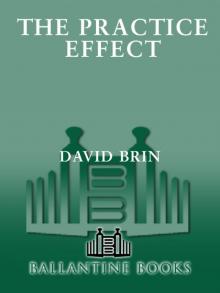 The Practice Effect
The Practice Effect Infinity's Shore
Infinity's Shore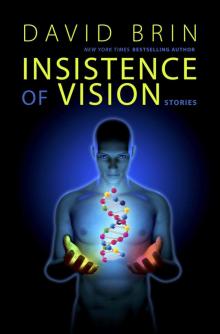 Insistence of Vision
Insistence of Vision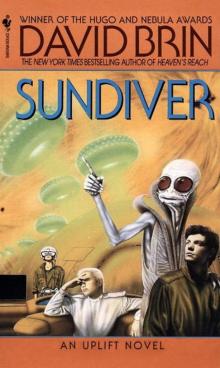 Sundiver
Sundiver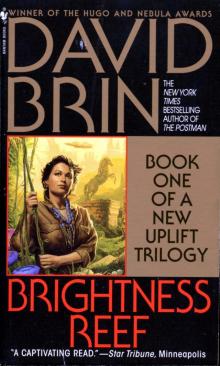 Brightness Reef
Brightness Reef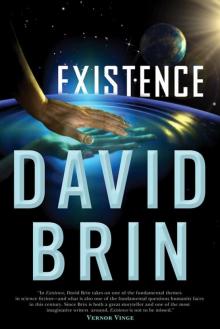 Existence
Existence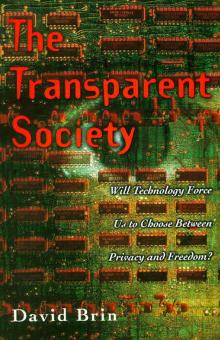 The Transparent Society
The Transparent Society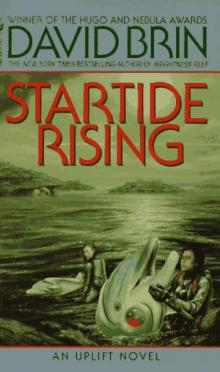 Startide Rising
Startide Rising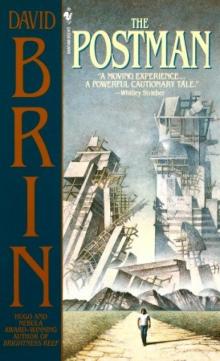 The Postman
The Postman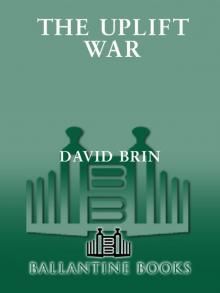 The Uplift War
The Uplift War The Loom of Thessaly
The Loom of Thessaly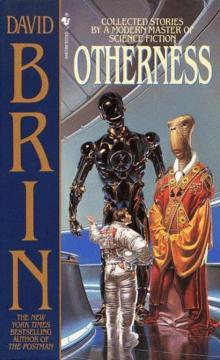 Otherness
Otherness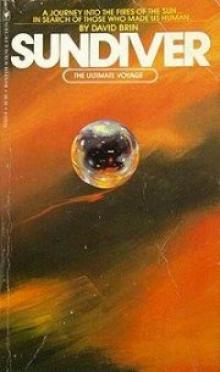 Sundiver u-1
Sundiver u-1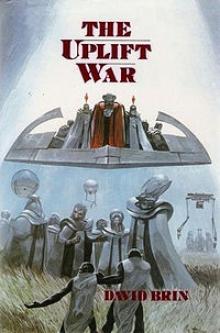 The Uplift War u-3
The Uplift War u-3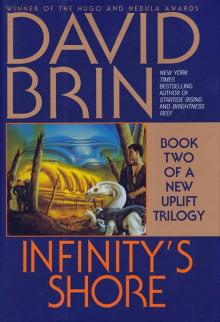 Infinity's Shore u-5
Infinity's Shore u-5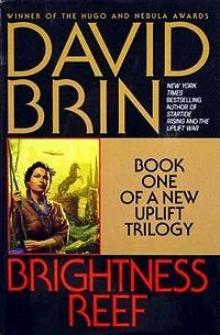 Brightness Reef u-4
Brightness Reef u-4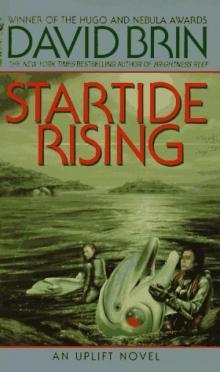 Uplift 2 - Startide Rising
Uplift 2 - Startide Rising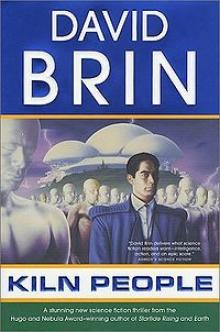 Kiln People
Kiln People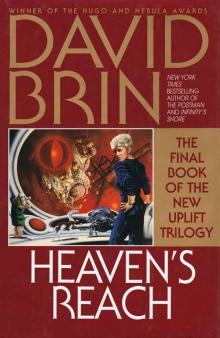 Heaven's Reach u-6
Heaven's Reach u-6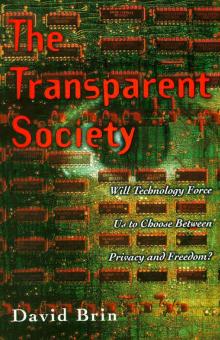 The Transparent Society: Will Technology Force Us to Choose Between Privacy and Freedom?
The Transparent Society: Will Technology Force Us to Choose Between Privacy and Freedom?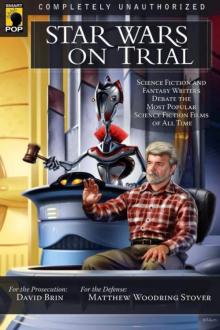 Star Wars on Trial
Star Wars on Trial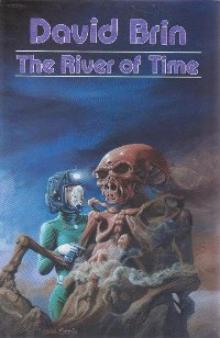 Lungfish
Lungfish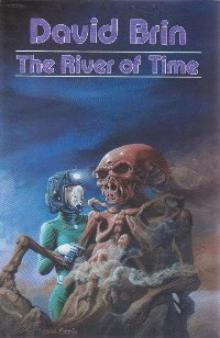 Tank Farm Dynamo
Tank Farm Dynamo Just a Hint
Just a Hint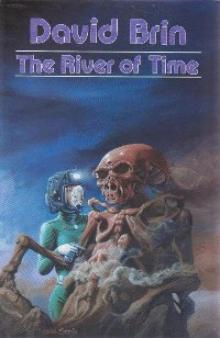 A Stage of Memory
A Stage of Memory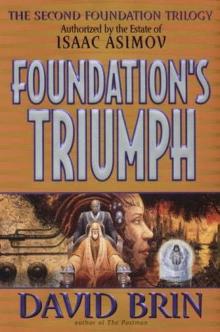 Foundation’s Triumph sf-3
Foundation’s Triumph sf-3 Thor Meets Captain America
Thor Meets Captain America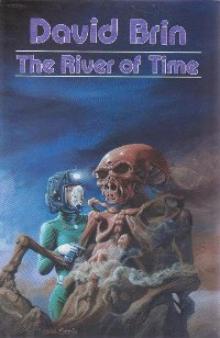 Senses Three and Six
Senses Three and Six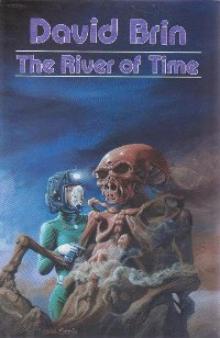 The River of Time
The River of Time Chasing Shadows: Visions of Our Coming Transparent World
Chasing Shadows: Visions of Our Coming Transparent World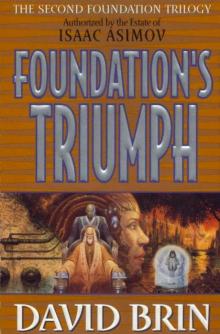 Foundation's Triumph
Foundation's Triumph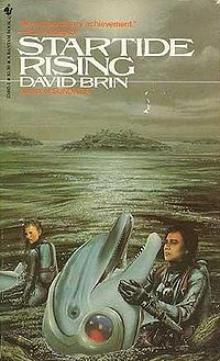 Startide Rising u-2
Startide Rising u-2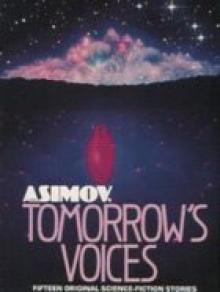 The Fourth Vocation of George Gustaf
The Fourth Vocation of George Gustaf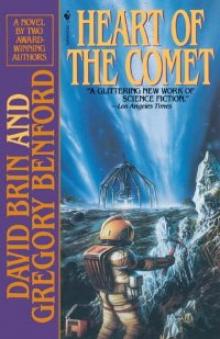 The Heart of the Comet
The Heart of the Comet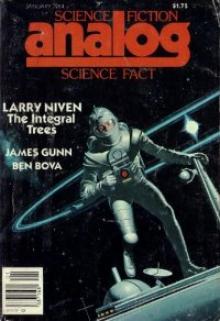 The Crystal Spheres
The Crystal Spheres